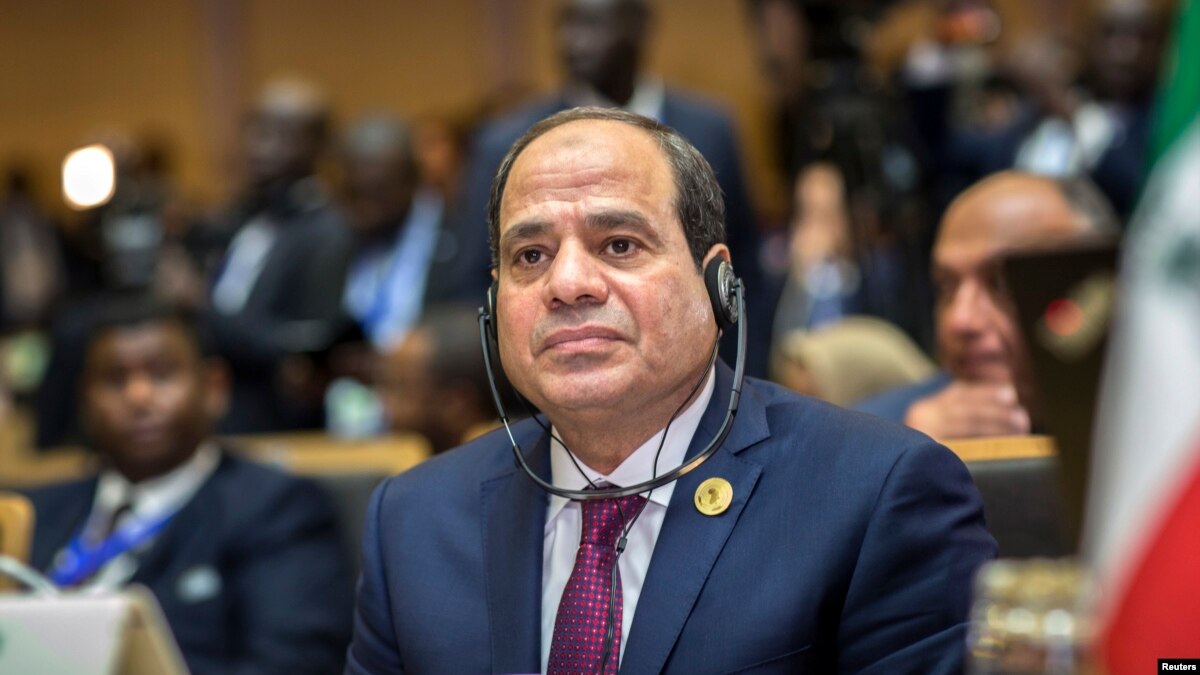
Seven years ago, thousands of Egyptians took to the streets in protest against the government led by President Hosni Mubarak. When Mubarak was forced out of office, and democratic elections put the country’s first civilian leader in decades in office, there was hope for lasting political change.
This week, however, Egypt’s current president sternly warned the opposition that he won’t tolerate their plans to organize a boycott of national elections, after independent candidates dropped out of the race. Now, political analysts say hope is fading.
General Abdel Fattah el-Ssisi won the presidency in the 2014 election, after leading a military coup that ousted his predecessor, Mohamed Morsi - Egypt's first freely elected civilian president.
Since then, critics say Sissi’s government has engaged in human rights violations, imprisoning journalists and members of the opposition.
“As long as the current regime is not willing to open up the political space, I think we are going to see a continuation of a status quo which is a high level of repression and a kind of parliamentary façade but is really only a façade,” says Shadi Hamid, a senior fellow at the Brookings Institution in Washington.
Opposition boycott
This week, several opposition groups joined in calling for a boycott of the March 26-28 election. They called it a charade, after six candidates dropped out. Sissi’s only opponent now is Mousa Mustapha Mousa, the leader of the Ghad political party, which earlier endorsed Sissi’s candidacy.
Amy Hawthorne is the deputy director of research with the Project on Middle East Democracy in Washington. She says that although Sissi said he wanted a true election, he didn’t really want competition.
“The fact that several of these would-be candidates came from the military was even more apparently threatening to him, and so using a variety of measures, and tricks and means, the Egyptian authorities have managed to either disqualify on very shaky grounds these would-be candidates, or has intimidated, threatened and pressured them, their families, their supporters, leading them to pull out,” Hawthorne said.
She says the effort to suppress the opposition is a waste, because many people think it likely that Sissi would win a fair election.
The opposition parties say Mousa is simply running to give the impression of a fair election. Mousa has said he is running to help the country and that he is acting independently of Sissi.
Other regional analysts say Sissi’s control of the government is complete. They say parliament has introduced laws that impede freedom of expression and criminalize civic society activities.
In addition, the Egyptian judiciary has abandoned the rule of law, said Sahar Aziz, a law professor at Rutgers University in the U.S. state of New Jersey.
“By rule of law I mean open and fair hearings by unbiased and qualified judges, a degree of predictability and limitation of arbitrariness of government actions and a level of individual rights and freedoms in accordance with international norms,” Aziz said.
Tolerating Sissi’s government
Dalia Fahmy, an associate professor of political science at Long Island University, in New York state, said the military has tightened its grip over political and social life, and the media. Under these conditions, she thinks it will be very difficult to promote democracy.
“From within it has to be a level of political openness, there has to be the ability for dissidents to congregate, form political parties, a level of political contestation, but more so there has to be a free and vibrant media,” Fahmy said.
Part of the problem, Fahmy said, is that many regional and Western governments tolerate Sissi.
“The international community really needs to hold the repressive regime accountable. We can’t continue this signaling game that you signal one thing to the people and something else to the regime,” she says.
Shadi Hamid said the U.S. administration has shown little public interest in promoting Middle East democracy.
Some in the administration of President Donald Trump say security for Egypt and the region is their primary concern, given the threat of attacks from Palestinian or Islamic State militants.Some advocates of U.S. policy say the administration does support human rights, although discreetly.
“I think that is problematic because terrorism does not fall from the sky; terrorism, extremism and political violence arise from a particular context and if there is a very repressive and closed context, that is actually a more conducive environment for extremism,” Hamid said.
Hawthorne said part of the problem is that many Western countries are exhausted by years of tumult in the Middle East.
She also said that since dictatorships can create temporary stability, many Western governments tolerate them as they focus on short-term solutions. Ultimately, she said, repressive governments fall.
“We can be sure that another wave of change and popular unrest will be coming,” Hawthorne said.
And, she said, it is likely the international community will be unprepared.
Read More Seven Years After Egyptian Uprising, Democracy Seems Distant Hope : http://ift.tt/2nwnNKz
No comments:
Post a Comment